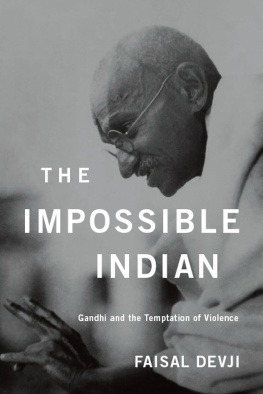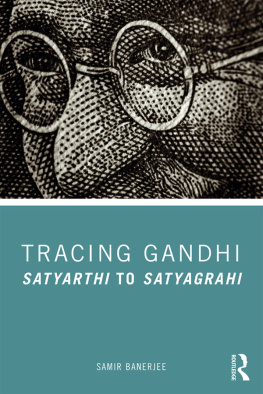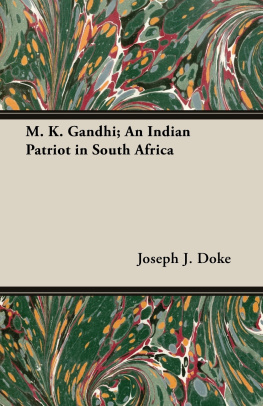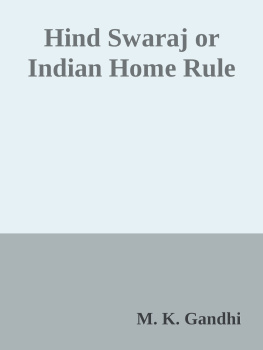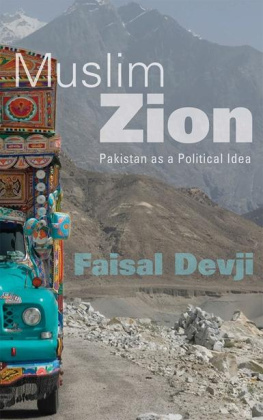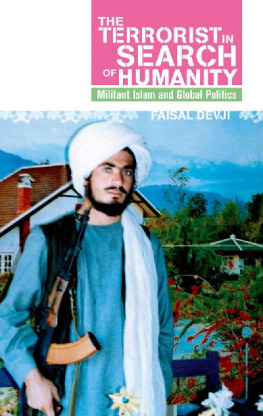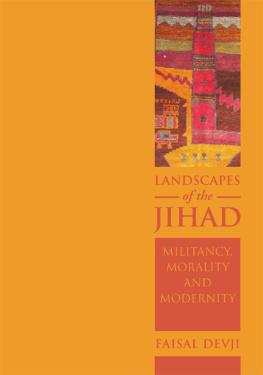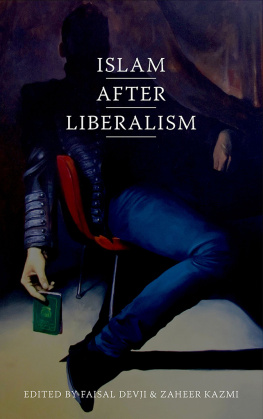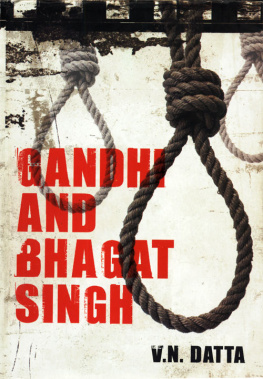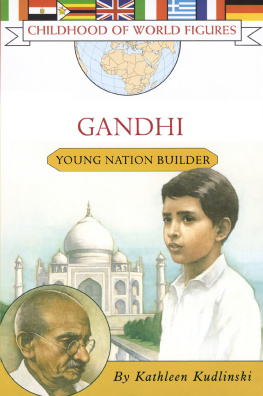Devji Faisal - The Impossible Indian: Gandhi and the Temptation of Violence
Here you can read online Devji Faisal - The Impossible Indian: Gandhi and the Temptation of Violence full text of the book (entire story) in english for free. Download pdf and epub, get meaning, cover and reviews about this ebook. City: Cambridge;Mass;India, year: 2012, publisher: Harvard University Press, genre: Politics. Description of the work, (preface) as well as reviews are available. Best literature library LitArk.com created for fans of good reading and offers a wide selection of genres:
Romance novel
Science fiction
Adventure
Detective
Science
History
Home and family
Prose
Art
Politics
Computer
Non-fiction
Religion
Business
Children
Humor
Choose a favorite category and find really read worthwhile books. Enjoy immersion in the world of imagination, feel the emotions of the characters or learn something new for yourself, make an fascinating discovery.
- Book:The Impossible Indian: Gandhi and the Temptation of Violence
- Author:
- Publisher:Harvard University Press
- Genre:
- Year:2012
- City:Cambridge;Mass;India
- Rating:3 / 5
- Favourites:Add to favourites
- Your mark:
- 60
- 1
- 2
- 3
- 4
- 5
The Impossible Indian: Gandhi and the Temptation of Violence: summary, description and annotation
We offer to read an annotation, description, summary or preface (depends on what the author of the book "The Impossible Indian: Gandhi and the Temptation of Violence" wrote himself). If you haven't found the necessary information about the book — write in the comments, we will try to find it.
Devji Faisal: author's other books
Who wrote The Impossible Indian: Gandhi and the Temptation of Violence? Find out the surname, the name of the author of the book and a list of all author's works by series.
The Impossible Indian: Gandhi and the Temptation of Violence — read online for free the complete book (whole text) full work
Below is the text of the book, divided by pages. System saving the place of the last page read, allows you to conveniently read the book "The Impossible Indian: Gandhi and the Temptation of Violence" online for free, without having to search again every time where you left off. Put a bookmark, and you can go to the page where you finished reading at any time.
Font size:
Interval:
Bookmark:
THE IMPOSSIBLE INDIAN
FAISAL DEVJI
THE IMPOSSIBLE
INDIAN
Gandhi and the Temptation of Violence
Harvard University Press
Cambridge, Massachusetts
2012
Copyright Faisal Devji, 2012
All rights reserved
Jacket art: Bettmann/Corbis
Jacket design: Graciela Galup
First published in the United Kingdom in 2012 by
C. Hurst & Co. (Publishers) Ltd.,
41 Great Russell Street,
London, WC1B 3PL
First Harvard University Press edition, 2012
Library of Congress Cataloging-in-Publication Data
Devji, Faisal.
The impossible Indian : Gandhi and the temptation of violence / Faisal Devji.
p. cm.
Includes bibliographical references and index.
ISBN 978-0-674-06672-4 (cloth : alk. paper)
1. Gandhi, Mahatma, 18691948Philosophy. 2. Gandhi, Mahatma, 18691948Political and social views. 3. IndiaHistorySepoy Rebellion, 18571858Influence. 4. StatesmenIndiaBiography.
I. Title.
DS481.G3D4465 2012
954.035092dc23 [B] 2012019637
CONTENTS
An admirer of Gandhis, my father kept a framed photograph of the Mahatma in his Dar-es-Salaam office. But though I grew up with a sense of respect for the old man depicted seated at his spinning wheel in this image, it was only when Id finished my formal education that I felt the seductive force of his ideas. Much of my work since then has been informed by a fascination with Gandhis thought, even though very little of it has dealt explicitly with the Mahatma. This book is an attempt to render visible my obligation to Gandhis ideas, while at the same time making what I hope is a new case for their author to be considered one of the great political thinkers of our times.
I owe many and varied thanks to friends and colleagues over a lengthy period, whose insights into Gandhis career have informed my writing of this book. Foremost among them is Uday Mehta, with whom Ive been talking about the Mahatma during our peregrinations across three continents. In New Haven and then New York, conversations with Carol Breckenridge and Arjun Appadurai, as well as Vyjayanthi Rao and Satya Pemmaraju, contributed much to my understanding of the Mahatmas international career and ambiguous heritage in modern India. The course on violence and nonviolence that Vyjayanthi and I taught at The New School For Social Research in 2008 allowed me to gather my thoughts on Gandhis politics, as did the conferences that Ritu Birla and I organized in Johannesburg in 2009 and Mumbai in 2010 on the Mahatmas first book, Hind Swaraj, and the special issue of Public Culture that we edited from the papers presented there. Im also grateful for the conversations I had with Akeel Bilgrami and Ajay Skaria during this period.
More recently, between New York and Oxford, I have benefitted enormously from discussions with Richard Sorabji, Chris Bayly and in particular Shruti Kapila, with whom I edited a set of essays on Indian political thought for Modern Intellectual History in 2010. Shruti has been the single most important force preventing my wholesale seduction by all things Gandhian. I am also grateful to David Arnold, Dipesh Chakrabarty and Ruth Harris for their advice on the drafts and portions of my manuscript they so generously read. My colleagues at the South Asia History Seminar in Oxford provided me with the scholarly context in which this book was conceived, for which I want to thank Polly OHanlon, Aparna Kapadia, Sarmila Bose, Maria Misra and Judith Brown, whose two volumes on Gandhi remain the authoritative account of his career. I also want to thank Agnibho Gangopadhyay for checking and correcting my Gandhi citations at the Bodleian. To Rachel and Michael Dwyer I owe a great debt for their intellectual as well as more material hospitality, and to Christophe Carvalho my thanks for affording me the leisure to write in Mumbai and Goa.
Portions of this book have appeared previously in the following journals, whose publishers I would like to thank for permission to reprint these texts:
A Practice of Prejudice: Gandhis Politics of Friendship, Subaltern Studies X11, 2005. Reprinted with permission by Permanent Black.
The Mutiny to Come, New Literary History, vol. 40, no. 2, Spring 2009, pp. 411430. Adapted with permission by The Johns Hopkins University Press.
Morality in the Shadow of Politics, Modern Intellectual History, vol. 7, no. 2, July 2010, pp. 373390. Reproduced with the permission of Cambridge University Press.
The Paradox of Nonviolence, Public Culture, vol. 23, no. 2, Spring 2011, pp. 269274. Reprinted by permission of the publisher, Duke University Press.
Faisal Devji Oxford, March 2012
Towards the end of his memoir describing the events leading up to Indias independence in 1947, the labor activist Kanji Dwarkadas summed up the character of Gandhi, whom he had known for nearly thirty years, in the following irate paragraph:
Gandhiji appealed to the imagination of the world as a little, scrawny, half-starved, self-denying man in a breach-clouta wizened little monkey defying the terrible British liona sort of incarnation of Hanuman, the monkey-god, as I heard one intellectual, non-Congress Indian describe him. This Gandhi has been apotheosized by the millions of the Indian masses today. His very irrationality, his mystical defiance of the principles of common sense, his persistence in spite of his Himalayan blunders, the frequent success of his fantastic, almost crack-brained schemes, endeared him to both the masses and the extremist intellectuals.
Uncharitable though it may be, this description of the Mahatma from a book with a foreword written by Clement Attlee, who as Britains prime minister had presided over the dissolution of her Indian empire, nicely represents the bafflement of Gandhis friends as well as enemies when faced with his politics of nonviolence. Leaving aside figures who, like Churchill, were altogether opposed to Indias independence, even those who desired and fought for her freedom were often frustrated by the Mahatmas politics, which accorded with the aims neither of his partisans on the left nor indeed on the right. And Dwarkadas is as scornful of these figures, like the Congress leaders Jawaharlal Nehru and Vallabhbhai Patel, who he thought had gained power by latching onto Gandhi while mostly disagreeing with his politics, as he is of those Hindu or Muslim nationalists who opposed the Mahatma from outside the Indian National Congress, each by accusing him of betraying their community to the other.
Dwarkadas acknowledged Gandhis moral sincerity as well as his tremendous popular appeal, but was appalled at the toll in life, suffering and internal conflict that he thought the politics of nonviolence had taken in India over three decades. And so the historical narrative he offers in this book and others that he wrote is one in which the Mahatmas practices of non-cooperation or civil disobedience are seen as interrupting and delaying a constitutional process leading to the countrys independence, which was eventually achieved only at the cost of a partition between its Hindu and Muslim territories accompanied by immense massacres, migrations and a never-ending confrontation with Pakistan, the unwanted new partner in Indias freedom.
As a liberal suspicious of Gandhis politics, Dwarkadas emphasizes what he sees as its futility, and in doing so voices the one argument that unites all of the Mahatmas critics, who think his career a failure because it manifested either too much or too little of a virtue like nonviolence. Details apart, such arguments represent a basic judgment, namely that Gandhi was a politician unable to achieve his objective, a single independent country at peace with itself and its neighbors. Whether or not the counterfactual narrative Dwarkadas then presents of history without the Mahatma is persuasive, envisioning as it does an undivided India gaining the status of a self-governing dominion like Canada before the Second World War, and with Pakistans founder Mohammad Ali Jinnah as her first prime minister, what is revealing is its dawning recognition that Gandhis nonviolent politics might not simply have been about independence after all.
Next pageFont size:
Interval:
Bookmark:
Similar books «The Impossible Indian: Gandhi and the Temptation of Violence»
Look at similar books to The Impossible Indian: Gandhi and the Temptation of Violence. We have selected literature similar in name and meaning in the hope of providing readers with more options to find new, interesting, not yet read works.
Discussion, reviews of the book The Impossible Indian: Gandhi and the Temptation of Violence and just readers' own opinions. Leave your comments, write what you think about the work, its meaning or the main characters. Specify what exactly you liked and what you didn't like, and why you think so.

